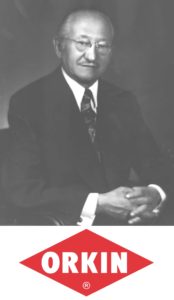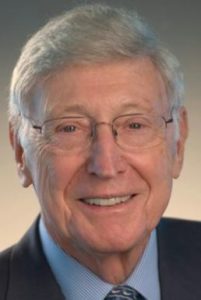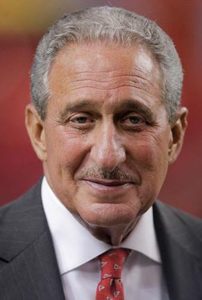Otto the Orkin Man
 Otto Orkin (1885-1968) was born in Latvia to a traditional Jewish family that immigrated to Pennsylvania when he was three years old. The family settled on a farm, and Otto’s job as a child was to make sure the rats didn’t eat their stocks. The neighbours soon heard of his success, and asked the young Otto to take care of their pests, too. At 14, Otto borrowed 50 cents from his parents to invest in a supply of arsenic, and began experimenting to find the perfect blend of rat poison. He spent hours in attics and granaries watching rat behaviour and carefully studying them. The young Orkin became an expert at rat control, and began selling his services door-to-door. At 16, he founded his own pest control company, Orkin The Rat Man. He continued growing the business, travelling across the country to sell his revolutionary formulas and methods. In 1909, he found that Richmond, Virginia did not have a pest exterminator and settled there. In 1925, Orkin’s company won its first government contract to get rid of rats for the Army Corps of Engineers. During this time, he found that Atlanta, Georgia also did not have an exterminator, and soon moved his headquarters there, renaming the business to Orkin Exterminating Company. It was also during this time that he introduced the diamond-shaped logo now famous across North America. By 1930, Orkin had 13 permanent branches in 8 states, and fifteen years later 82 branches in 14 states. During World War II, Orkin played a huge role in assisting the war effort by providing chemicals and pest control, and making sure that over 150 military installations were sanitary. The company continued to grow, and by 1950 had over 1000 employees operating in 20 states. This rapid growth was partly fueled by Orkin’s famous generosity. He paid very good salaries and all of his managers made more money than he did himself. It was also fueled by great marketing, especially the popular “Otto the Orkin Man” TV commercial – thought to be the most recognizable jingle in America at the time. Unfortunately, Orkin’s sons soon sought to wrest control of the company from him. He eventually gave in and sold his shares. The company went downhill after that, and was bought out by Rollins Inc. in 1964. Orkin continued to be a generous philanthropist until his last days. Beloved by all those who knew him, one employee said of Orkin that he had “a singleness of purpose, a goal he never lost sight of, and he worked tirelessly and diligently to achieve that goal. His was the epitome of the American Dream we hear so much about. His contribution to the industry is inestimable.”
Otto Orkin (1885-1968) was born in Latvia to a traditional Jewish family that immigrated to Pennsylvania when he was three years old. The family settled on a farm, and Otto’s job as a child was to make sure the rats didn’t eat their stocks. The neighbours soon heard of his success, and asked the young Otto to take care of their pests, too. At 14, Otto borrowed 50 cents from his parents to invest in a supply of arsenic, and began experimenting to find the perfect blend of rat poison. He spent hours in attics and granaries watching rat behaviour and carefully studying them. The young Orkin became an expert at rat control, and began selling his services door-to-door. At 16, he founded his own pest control company, Orkin The Rat Man. He continued growing the business, travelling across the country to sell his revolutionary formulas and methods. In 1909, he found that Richmond, Virginia did not have a pest exterminator and settled there. In 1925, Orkin’s company won its first government contract to get rid of rats for the Army Corps of Engineers. During this time, he found that Atlanta, Georgia also did not have an exterminator, and soon moved his headquarters there, renaming the business to Orkin Exterminating Company. It was also during this time that he introduced the diamond-shaped logo now famous across North America. By 1930, Orkin had 13 permanent branches in 8 states, and fifteen years later 82 branches in 14 states. During World War II, Orkin played a huge role in assisting the war effort by providing chemicals and pest control, and making sure that over 150 military installations were sanitary. The company continued to grow, and by 1950 had over 1000 employees operating in 20 states. This rapid growth was partly fueled by Orkin’s famous generosity. He paid very good salaries and all of his managers made more money than he did himself. It was also fueled by great marketing, especially the popular “Otto the Orkin Man” TV commercial – thought to be the most recognizable jingle in America at the time. Unfortunately, Orkin’s sons soon sought to wrest control of the company from him. He eventually gave in and sold his shares. The company went downhill after that, and was bought out by Rollins Inc. in 1964. Orkin continued to be a generous philanthropist until his last days. Beloved by all those who knew him, one employee said of Orkin that he had “a singleness of purpose, a goal he never lost sight of, and he worked tirelessly and diligently to achieve that goal. His was the epitome of the American Dream we hear so much about. His contribution to the industry is inestimable.”
A Kabbalistic Look at Pregnancy and Abortion
Words of the Week
It is true that it is not a good situation for us, but when did we have it better? Now the oppressor is Hitler, once it was Haman, Pharaoh, Torquemada, Purishkevich—only the names change, but the suffering remains the same. It is possible that the troubles in the past were greater. When we compare the entire Jewish situation in the world to certain eras in Jewish history, it will emerge that Jews are now doing much better than in certain difficult eras of the past. There is no reason to despair.
– Rabbi Yosef Rosen, the Rogatchover Gaon


